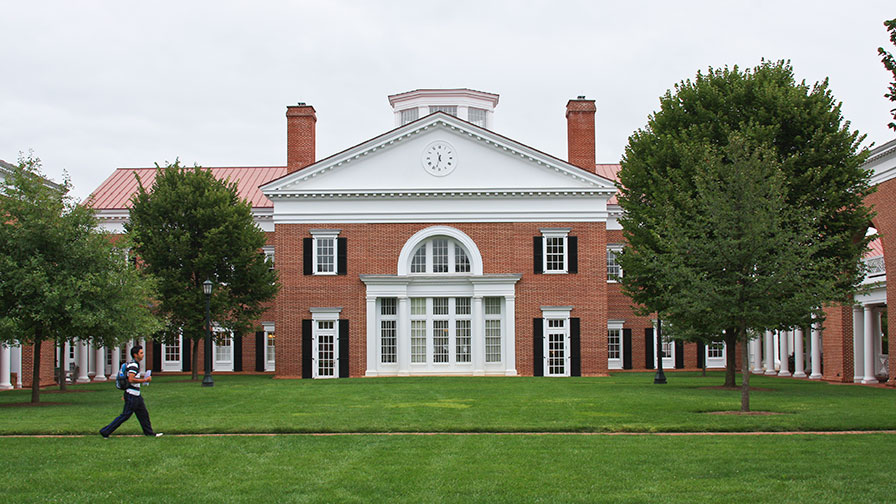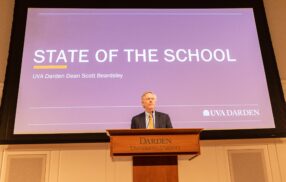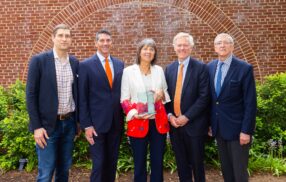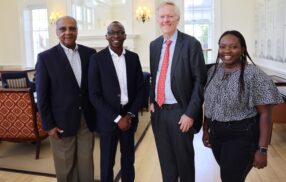
Darden School Global Conference Challenges the Status Quo
By Carlos Santos
The 2015 Darden Global Conference, held 30 January at the University of Virginia Darden School of Business, encouraged members of the 200-plus audience to “Challenge the Status Quo,” to transcend social barriers and to create opportunities that will make a positive impact on people for years to come. The second annual student-led conference examined three topics: doing business in tough environments, impact investing and the global financial market going forward.
Keynote speakers included Rakesh Mohan, executive director at the International Monetary Fund and a former Deputy Governor of the Reserve Bank of India, and Joaquim Souza (MBA ’99), CEO of Caixa Banco de Investimento. Other speakers included seven Darden alumni who shared their experiences making a difference. Panels were moderated by Professors Yiorgos Allayannis, Bobby Parmar and Frank Warnock.
Alex Fife (MBA ’14), director of operations at Village Capital, a venture fund that “supports entrepreneurs out to change the world in a good way,” spoke about impact investing.
“The big problem is trying to solve problems in how capital is allocated,” said Fife. “Capital is going to people who can generate great returns but not change things that matter.”
And that means that social entrepreneurs “don’t have access to capital to grow their solutions,” said Fife. “Our business is finding those entrepreneurs who solve problems that matter and to make a good return … .We find entrepreneurs who have been overlooked but have great solutions. It’s been quite a ride.”
Village Capital has so far supported 300 “mission-driven” entrepreneurs on six continents. Fife said the fund uses “peer support’ to find the best ideas to fund. For example, the fund will choose 12 entrepreneurial companies and have them vote for the top two companies that can best solve the problem. “Say it’s about solving an agricultural problem in Kenya … they live and breathe it. They know who’s real and who isn’t.”
Impact investing sometimes has a surprisingly good bearing on the bottom line. Alejandro Preusche, director at Almado, a family business that works to deepen the involvement of businesses in reducing poverty, said he became aware at one point of “the human side to business we weren’t paying attention to.”
Almado bought farmland in a poor region in Paraguay at a low cost. “The poverty there lowered the price of the assets. Nobody wanted to be there,” he said. But by investing in improving the land and the community and its infrastructure, “thousands of lives were improved significantly.” The land value also rose as other investors were attracted to the region. “That was an eye-opener. Pay attention to the needs of the poor, and you’ll have a better business,” said Preusche.
Preusche characterized impact investing this way: “It’s paying attention to the human side of business. It’s much better to have a social impact and make a good return than to just make a good return.”
Pat Wilson, an investment officer at Accion’s Frontier Investments Group — a fund focused on new ways of financial inclusion throughout Africa, Asia and Latin America — said simply solving how to move money around in Zambia digitally made money and helped the poor. The investment group invested in Zoona, which provide money transfer and other payment services to low-income consumers.
The conference speakers also explored how to do business in a tough environment.
“Challenge is a constant. If you don’t look for tough environments and challenges you will miss out on opportunities,” said Andre Laloni, managing director of Barclays Capital. Jill Simandl Douthit (MBA ’03) said, “It’s always a tough business environment out there. It’s always a challenge.”
And as for doing business in different areas of the world where cultures can seem complicated, Chika Umeadi, co-founder of Tiphub, a business that provides advice for social impact ventures in Africa, simply outsources the job to other organizations. “That mitigates cross-cultural biases. They understand the culture way better than we do.”
Taking a hard look at global financial markets were Daniel Blitz (MBA ’07), an independent consultant, and Jonathan England (MBA ’06) and Blake Lipscomb (MBA ’06) of Corriente Capital.
England spoke of ways to preserve wealth — given that a surprising number of companies have catastrophic losses. England noted that 40 percent of companies in the Russell 3,000 suffered some sort of catastrophic loss since 1980.
Lipscomb and Blitz warned of China’s unsustainable credit growth. “It’s the highest growth rate in the emerging markets,” said Blitz. Lipscomb said, “The threat of the bursting credit bubble will force the Peoples Bank of China to print more currency. The PBOC will have no choice but to allow the currency to devalue versus the U.S. dollar.” That’s bad news for the yuan.
Several Darden MBA student affinity clubs — the International Business Society, Asia Business Club at Darden, Darden African Business Organization, Darden South Asia Society, European Society and Latin American Student Association — collaborated to organize the conference. Darden’s Center for Global Initiatives sponsored the conference.
The University of Virginia Darden School of Business prepares responsible global leaders through unparalleled transformational learning experiences. Darden’s graduate degree programs (MBA, MSBA and Ph.D.) and Executive Education & Lifelong Learning programs offered by the Darden School Foundation set the stage for a lifetime of career advancement and impact. Darden’s top-ranked faculty, renowned for teaching excellence, inspires and shapes modern business leadership worldwide through research, thought leadership and business publishing. Darden has Grounds in Charlottesville, Virginia, and the Washington, D.C., area and a global community that includes 18,000 alumni in 90 countries. Darden was established in 1955 at the University of Virginia, a top public university founded by Thomas Jefferson in 1819 in Charlottesville, Virginia.
Press Contact
Molly Mitchell
Associate Director of Content Marketing and Social Media
Darden School of Business
University of Virginia
MitchellM@darden.virginia.edu





